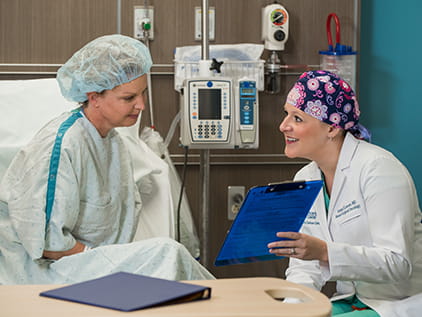Pap Smear
A Pap smear is a screening test that checks a woman’s cervical cells to make sure they’re healthy. An abnormal Pap test result can indicate precancerous changes in the cervix. Early diagnosis and treatment for cervical cancer can be lifesaving. Your doctor can also use a Pap test to check for HPV, a sexually transmitted disease that’s a primary cause of cervical cancer.
The University of Kansas Health System provides advanced care for women with abnormal Pap test results, including HPV. We also offer well woman exams to ensure that any health concerns you have are addressed proactively to support your well-being.
What is a Pap smear?
The most effective screening test for cervical cancer, a Pap smear can identify cancerous and precancerous cells in the cervix. During a Pap smear, your doctor collects a small sample of cervical cells, then sends them to the lab for further examination. Depending on the results of your Pap test, your doctor may recommend additional tests and treatments such as a colposcopy.
We offer a variety of appointment types. Learn more or call 913-588-1227 to schedule now.
Who can have a Pap smear?
A Pap smear used to be scheduled every year along with an annual pelvic exam. Today, doctors generally recommend that women between the ages of 21 and 65 have a Pap test every 3 years. Your doctor may recommend a different schedule if Pap smears are combined with a human papillomavirus (HPV) test as well.
In some cases, your doctor may want you to get Pap tests more often – for example, if you’ve previously had an abnormal Pap smear, are HIV positive or have a history of additional risk factors for cervical cancer. Alternatively, some women may not need an annual Pap smear at all. Women over age 65 or women who do not have a cervix can often stop scheduling Pap tests, if their doctor agrees.
What does a Pap smear diagnose?
A Pap smear can check for:
- Abnormal cervical cells
- HPV
- Precancerous and cancerous changes in the cervix

Cancer care you can count on
The University of Kansas Cancer Center is 1 of fewer than 60 NCI-designated comprehensive cancer centers in the nation, and it's part of The University of Kansas Health System.
What are the risks of a Pap smear?
A Pap smear is a low-risk procedure, especially compared to the benefits of early detection, diagnosis and treatment of cervical cancer. Some women experience discomfort during their Pap test or mild cramping afterward.
Sometimes, a Pap smear may incorrectly show that there are no abnormal cells present. This is known as a false negative result. A false negative Pap smear can occur for multiple reasons, and may require a retest.
Before your Pap smear
To ensure the most accurate results from your Pap smear, plan your test for a time when you won’t have your period. You should also refrain from intercourse and avoid any vaginal medications or douching for at least 48 hours before your Pap test.
What to expect during your Pap smear
Once it’s time for your Pap test, your doctor will have you undress and recline on the exam table and place your feet in stirrups. They will gently insert a speculum, which is a medical instrument that holds the walls of your vagina open. Next, your doctor will visually examine your cervix before taking a sample of cells. Although you may feel some pressure or feel uncomfortable, a Pap smear doesn’t usually hurt.
Recovery and results for your Pap smear
After your Pap test, you can return to your normal daily routine. Your doctor will contact you with your results. If the Pap smear does show abnormal cells, your doctor may schedule you for follow-up testing or additional procedures. Your doctor may also need to take a larger tissue sample (biopsy) for further testing.
If your Pap smear results are normal, your doctor will let you know when you should schedule your next test. For most women, Pap tests are recommended every 3 years.







